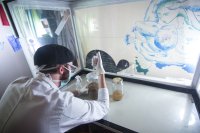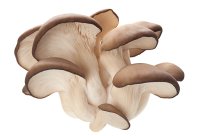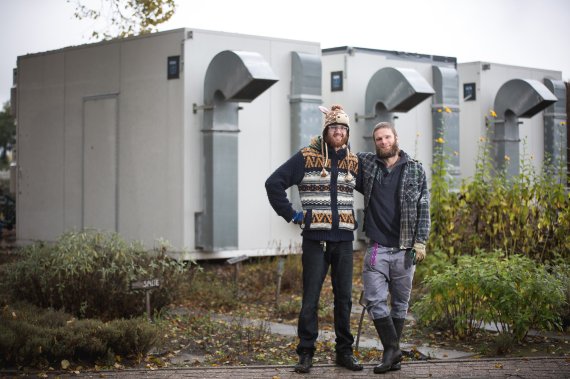Photos: Sven Menschel
Ex-Wageningen students Sander Reimink and Tom Bewernick are men with a mission: helping the world with their own mushroom farm. Reimink: ‘We want to prove that a commercial enterprise does not have to be bad for the planet. On the contrary, our company Mycocycling should have a healing and restorative effect on the planet.’
Reimink became interested in edible fungi as a student of Biology at Wageningen University. His fascination for mycology was particularly awakened by the course Magical mushrooms, slayers and sex: how moulds mould society. He was given a kit with which to grow edible mushrooms himself at home and that became first a hobby and now his work.

Reimink is fascinated by the role played by fungi in the natural world. ‘They are the world’s cleaners, they make the world healthy again. They are the link between waste products and new life. That happens right in front of me in our company too.’ He explains that he and Bewernick grow the mushrooms on a substratum of coffee grounds from local catering outlets, grain residue from local breweries and sawdust from local sawmills. The mushrooms turn this into compost which the young entrepreneurs want to sell to local farmers. ‘That is the healing aspect of our business. We reuse everything and we then give something back to nature.’
Microcredit
Tom Bewernick from Germany, who graduated in Geo-information science earlier this year, got interested in mushrooms through his ex-girlfriend in Wageningen. She is a keen mushroom forager and cook. Bewernick suffered from depression at that time and realized during a forest walk that he wasn’t happy in the research job he was doing. In the forest he came to the conclusion that he should make a switch and become a farmer. Then he met Reimink and they started growing mushrooms at Droevendaal and working on their plan to set up a serious company.
That plan got into the fast lane when they got permission from the Hoge Born care farm on the Bornsesteeg to grow mushrooms there. Shortly afterwards they got a microcredit of 8000 euros from Startlife, an organization which supports start-up agrofood companies. This provided them with the funding they needed to launch their own company. In June they went to the chamber of commerce to register, and now they share an office with another young company in the StartHub building. Reimink: ‘When we heard that we had qualified for a microcredit we really got that feeling: oh crap, we really are going to implement our ideas!’
Mushroom subscription
In order to qualify for the credit and the office space at StartHub, the alumni had to write a business plan. Their plan is to sell their mushrooms through subscriptions to households in and around Wageningen. Customers can receive home deliveries of mushrooms weekly or fortnightly, or they can collect them at a local collection point. The business would break even with 40 households. ‘We did the rounds at Droevendaal and everyone there was interested and enthusiastic about a subscription. I think we can find those 40 households quite quickly,’ says Reimink.
The pair are looking into other markets as well. Restaurants and shops in the region could be interested in their products, and they are also talking to organic food producers who do packages of fresh vegetables. Fewer vegetables are grown in the winter and the entrepreneurs think their mushrooms – which they can produce steadily all year round – would be a good addition. Through the vegetable deliveries they think they could reach hundreds of households in and around Wageningen in future. And the young businessmen will also run workshops on mushrooms.
Oyster mushrooms

Reimink and Bewernick intend to grow their mushrooms in white containers with inbuilt air-conditioning. Three of these are already in position on the compound of De Hoge Born. They will pay the rent of 50 euros a month in mushrooms, which will come to about eight to ten kilos. To create an optimal environment for the mushrooms in the containers, the temperature, humidity and CO2 levels have to be regulated. The entrepreneurs designed and built in the monitoring system for this themselves. They are starting by growing oyster mushrooms. This variety is relatively easy and cheap to produce. Meanwhile they hope to deal with any teething troubles in their system. Once they’ve done that they want to add shiitake, king oyster and lion’s mane mushrooms to their assortment.
The alumni aim to make the entire production, operation and sales process as sustainable as possible. They reckon conventional mushroom farms produce a lot of plastic waste and sterilize the substratum they grow the mushrooms on. The Mycocycling men will use a non-sterile technique with which they save on energy. They will also be growing the mushrooms in plastic buckets they have collected from snackbars in the area. The substratum is made, as already mentioned, from organic waste from local companies and the mushrooms will be sold regionally.
The alumni hope other entrepreneurs will follow their example and that eventually the whole economy will therefore change. And that, they believe, is how we can heal the world little by little.

